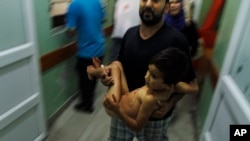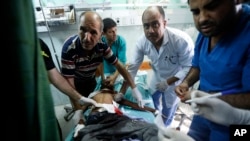The World Health Organization is calling for a humanitarian corridor in Gaza to transport the wounded for urgent treatment to medical facilities outside the conflict zone.
WHO suggests that the emergency medical facilities be located at crossing points between the Gaza Strip and Israel as well as neighboring Egypt and Jordan.
Gaza cannot cope with the increasingly large number of people needing urgent medical care, according to the U.N. health agency, adding that hospitals, clinics and ambulances are being damaged, destroyed or rendered useless each day.
The number of civilian casualties from this conflict is increasing at an alarming rate, says WHO spokesman Paul Garwood.
The latest reports show more than 5,100 people have been injured since the fighting began more than two weeks ago, including 1,560 children and 1,700 women.
“This is behind the call for this humanitarian corridor ... because of the huge strains in the health facilities inside Gaza, coupled with the challenges to get replenishments to those facilities," Garwood said. "And the increasing insecurity on a daily basis is just increasing the number of people who are getting injured. They need better medical care."
WHO reports that four hospitals, 12 clinics, 10 ambulances and a specialized center for the disabled have been damaged. Surgical wards have been put out of service and all functioning health facilities are suffering severe shortages of supplies, particularly for surgical practices.
The U.N. health agency says a humanitarian corridor would facilitate the delivery of such supplies and possibly provide a medical failsafe should intensification of the conflict lead Gaza’s health care system to collapse.
Garwood says health professionals inside Gaza are overburdened and working under insecure conditions where ambulance drivers have come under fire and many patients are unable to reach health care centers.
“We are seeing major issues with diminishing supplies of electricity, concerns around the quality of water, and according to the Palestinian Water Authority, 95 percent of the water sources in Gaza are not suitable for human consumption," he added. "This is water that also is made available to hospitals. Electricity as well is a major issue for hospitals. There have been reported shortages of electricity in several of these facilities.”
WHO officials say states are obligated under international humanitarian law to make sure people are able to reach medical care in safety, even during armed conflict, and that hospital facilities are neutral places, which must be respected and protected by all warring parties.





